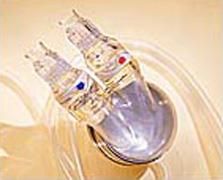
September 21, 2010 – Ventricular assist devices (VADs) can restore normal hemodynamics and support recovery of native cardiac function after acute myocardial infarction (AMI), according to a study published in the September 2010 issue of The Annals of Thoracic Surgery. The study looked at patients who used Abiomed’s AB5000 Ventricular Assist Device.
“This is the largest reported paper on AMI cardiogenic shock patients on VAD support. It demonstrates that aggressive and early implantation of bridge to recovery VADs, such as the AB5000, can potentially improve recovery and survival outcomes of cardiogenic shock patients,” said Mark Anderson, M.D., Robert Wood Johnson Medical School. “Recovery should be the first option. Though VAD support for AMI cardiogenic shock patients is not yet in the clinical guidelines, this paper shows that temporary heart recovery devices have the ability to recover heart muscle and avoid heart transplantation in these critically ill patients.”
Results
• The estimated survival rate for AMI cardiogenic shock patients, calculated using the Logistic EuroSCORE, is less than 15 percent. The actual survival rate for the same patient population in the AB5000 registry was 40 percent.
• Roughly two-thirds, or 63 percent, of the survivors experienced recovery of their native hearts. Recovery was defined as patients demonstrating stable unassisted cardiac function 30 days after VAD explant or at discharge.
• The survival for recovery patients at two years after VAD explant was 78 percent (Kaplan-Meier estimated).
• Of the survivors who stayed on AB5000 support and were not able to recover their native hearts, 80 percent were successfully transplanted and discharged.
The AB5000 registry in The Annals of Thoracic Surgery can be viewed at: http://ats.ctsnetjournals.org/cgi/content/full/90/3/706?maxtoshow=&hits=10&RESULTFORMAT=&author1=anderson&fulltext=ab5000&searchid=1&FIRSTINDEX=0&sortspec=relevance&resourcetype=HWCIT
This paper can also be viewed as part of The Annals of Thoracic Surgery accredited CME program.
For additional information please visit: www.abiomed.com


 January 05, 2026
January 05, 2026 









